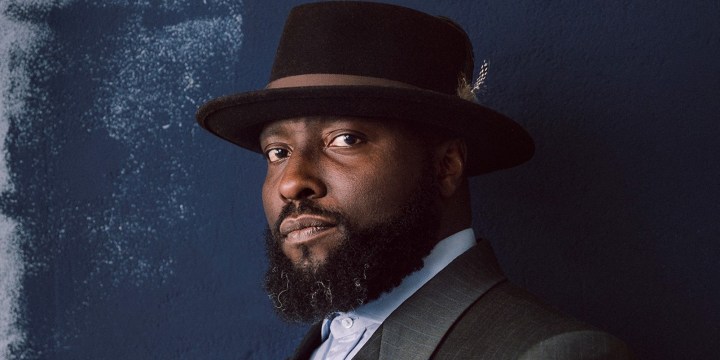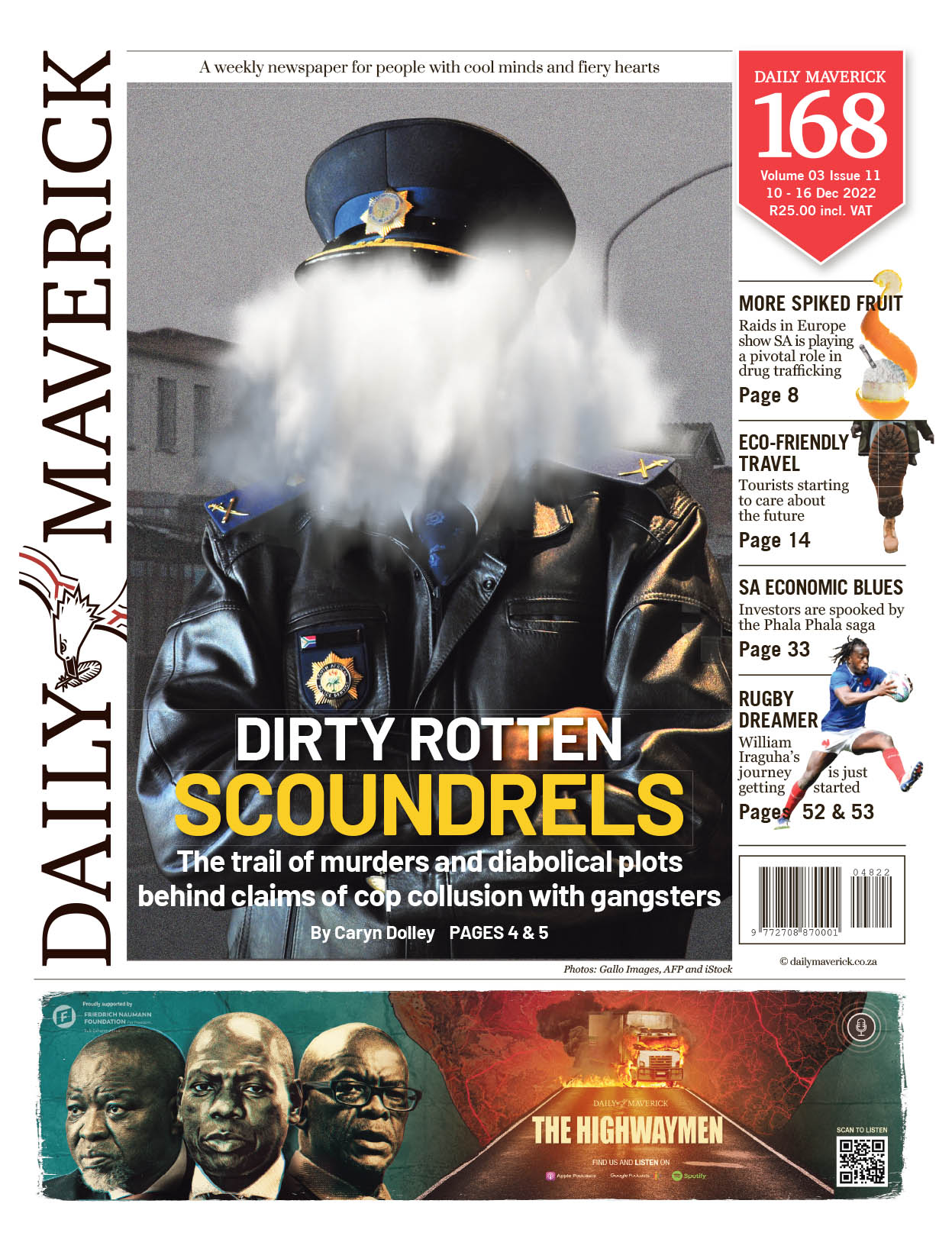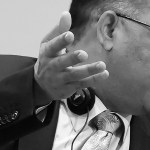CLOSE ENOUGH TO EXHALE
Examining and discussing ‘A Different Now’ with Bonaventure Soh Bejeng Ndikung

The internationally acclaimed art curator tackles questions about his new exhibition at the Goodman Gallery.
Goodman Gallery is staging “A Different Now is Close Enough to Exhale on You”, a group exhibition in three parts, guest-curated by Cameroon-born, Berlin-based curator and writer Bonaventure Soh Bejen Ndikung. The exhibition is at the Johannesburg and Cape Town galleries, with a satellite at Joburg’s Umhlabathi Collective, until 21 January 2023.
The title is from words by Nigerian artist Eloghosa Osunde, “…the fact that there is trust of a different now, close enough to exhale on you, it’s a message of deep hope”.
Ndikung says, “The whole idea comes out of the two years of duress and stress caused by Covid. The pandemic is a symptom of a bigger problem; in a post-colonial era, the more we destroy the environment, the more germs, [viruses] and bacteria come to us.”
DM: I sensed spiritual rhetoric in your statements as you conducted a walkabout, and a psychological element, before interpreting the artwork?
Ndikung: The artwork is at the beginning of the healing process. Exhibition-making is about creating conversation. Looking at the psychiatric and psychological, curating is to cure and not only to heal… I’m interested in our being in the whole world, I’m interested in how we’re going to make it in this world together.
Are you a transdisciplinary practitioner, being qualified in biotechnology and art curation?
It is extra-disciplinary, affording oneself the privilege of getting out of one’s discipline. I could have stayed doing biotechnology, but that is not enough. Biotechnology might help me find medication for diseases, but this conversation I’m having with you I could not have with biotechnology. I need to embrace other disciplines.
Aristocracy and proletarianism in the 21st century: is there a perceptual shift in cultural representation in terms of racial subjugation? Has the type of refinement previously juxtaposed with the Caucasian shifted to all races?
I disagree that aristocracy was restricted to Caucasians. It’s a question of visibility; because paintings made by Caucasians were more visible in certain areas does not make them more important; it doesn’t mean others were not doing their work. The history of painting in Africa spans thousands of years, from rocks to painting on fabrics, to weaving as painting, to colouration of fabrics. This is a very short-sighted way of looking at the history of art. Aristocracy has never been limited to a question of race; it’s a question of class, and class cuts across race. As much as we need to dismantle racial barriers, we also need to dismantle class barriers.
Visit Daily Maverick’s home page for more news, analysis and investigations
The diaspora is symbolised by dislocation and dispossession of culture. Does a global village conceptually dislocate indigenous minorities from the mainstream?
You have a trendy way of looking at things. People have always moved from place to place. This idea of people being stationary, I don’t know where it comes from. Civilisation is made when cultures exchange with each other. The idea of some locale being cut off from the world is actually nuts. People have always communicated. The Indian Ocean is the oldest continuum in human history, and this is way before any Vasco da Gama came here. People were moving from the east African coast to the west coast of the Indian subcontinent. Ten years ago, there was a show done by Okwui Enwezor called “The Glocal”, which looked at the local and the global. Local can be global. Also, diaspora means dispersal, people get dispersed and sometimes overshadow indigenous voices. But they also become localised. Our brothers in the Caribbean have been localised, even though they were taken forcefully. A new culture developed. Creole becomes very interesting. We cannot just put binaries out there … that’s what we talk about with Leo Asemota’s work; between the negative and the positive, there’s a lot.
Are traditional art definitions becoming obsolete, with normalisation of new technologies?
Every age has its technology. Once people had chalk, and they could paint on walls, on stones; then came finer colours, then came cotton, material, with each age we have different technologies … people experiment and work with them. Looking at new tech as erasing the past is not valid; they all speak to each other; there’s a continuum. I’m more interested in that continuum … computation itself is based on a binary structure; weaving is based on a binary structure as well, so computation is related to weaving. Computational structures could not have been made without our grandmothers’ weaving.
High art or low brow? Does the cost of art represent its refinement?
No, there’s nothing like high art, that’s just the market. I don’t think there’s a difference between art and craft. Look at Theresah Ankomah; those are techniques used to make baskets … a craft. What’s high? what’s low? Those are things that separate people.
With SAVVY Contemporary – The Laboratory of Form-Ideas, you’ve worked with Hassan Khan and Candice Breitz. Are there plans to work with more South African artists?
Oh yes. The space was founded by Africans in Berlin and is run by Africans, Asians and Latin Americans.
Is SAVVY Contemporary conceptual in nature?
You need to move beyond that. Painting can be conceptual art, as can sculpture. It’s about developing a concept and using the most appropriate material to interpret it.
Define the three-part exhibition, in terms of theme and objective.
I wanted to spread across different cities and spaces. What does the exhibition do? It creates a space to which you can invite artists from different parts of the world, from Iran to Nigeria, from South Africa to Germany, and think about our world and understand how to make the next step, how to forgive ourselves in order to move on. All the exhibiting artists in some way are in a pendulum between the political and poetical, taking stock of our time, understanding what is happening and what we need to do to move forward. DM168
Bonaventure Soh Bejeng Ndikung, author and biotechnologist, is founder and artistic director of SAVVY Contemporary in Berlin and artistic director of Sonsbeek20-24, a contemporary art exhibition in the Netherlands. He was artistic director of Bamako Encounters 2022, for African photography in Mali. He has curated many other exhibitions in various parts of the world. He is an MA professor at Weissensee Academy of Art in Berlin. In 2023, he will be director of Berlin’s Haus der Kulturen der Welt.
This story first appeared in our weekly Daily Maverick 168 newspaper, which is available countrywide for R25.





















Comments - Please login in order to comment.